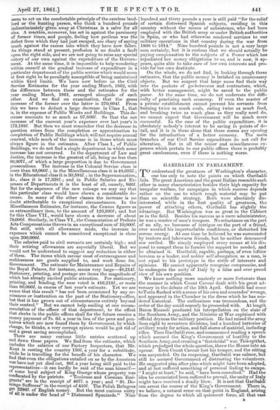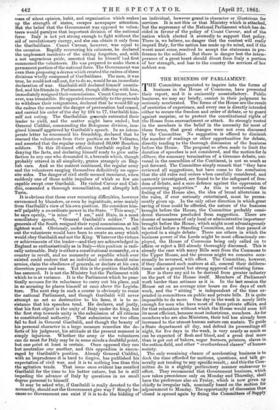GARIBALDI IN PARLIAMENT.
TO understand the greatness of Washington's character, one has only to note the points on which Garibaldi fails. The great American and the great Italian resemble each other in many characteristics besides their high capacity for irregular warfare, for campaigns in which success depends rather on the use to which rough material may be put than on scientific strategy. Both were absolutely dis- interested, while in the first quality of greatness, the power of attaching others, Garibaldi has slightly the advantage. But Washington was as great in the Cabinet as in the field. Besides his success as a mere administrator, he was a master of men's tempers. No reluctance on the part of an ally, no baseness of intrigue on the part of a friend, ever wearied his imperturbable confidence, or disturbed bia serene energy. At one time he believed he was surrounded by traitors and lukewarm friends, but he neither denounced nor reviled. He simply employed every means at his dis- posal to compel them to furnish the support he needed, and he obtained it. Garibaldi, capable, perhaps, of even loftier heroism as a leader, and nobler self-abnegation as a man, is not equal to his prototype in the strife of interests and opinions. He cannot apparently recognize compromise, and he endangers the unity of Italy by a false and over proud view of his own position. We know nothing more masterly or more fortunate than the manner in which Count Cavour dealt with his great ad- versary in the debate of the 19th April. Garibaldi had come to Turin flushed with a sense of his own and comrades' wrongs, and appeared in the Chamber in the dress which he has ren- dered historical. The enthusiasm was tremendous, and the order of the day could scarcely be proceeded with. At length Baron Ricasoli produced his interpellation on the state of the Southern Army, and the Minister at War explained with official dryness the military. position. He had raised the army from eight to seventeen divisions, had a hundred batteries of artillery ready for action, and full stores of mat6riel, including rifles. Then Garibaldi rose, and commenced reading a speech which accused the King's Government of hostility to the Southern Army, and creating a "fratricidal" war. This epithet, which prejudged the whole question, threw the House into au uproar. Even Count Cavour lost his temper, and the sitting was suspended. On its reopening, Garibaldi was calmer, but still he accused Government of distrusting the volunteers. He suggested plan after plan which might have been adopted, and at last suffered something of personal feeling to escape. " I might at least," he said, " have been consulted." Had the idea he enunciated been suffered to prevail, the unity of Italy might have received a deadly blow. It is not that Garibaldi can arrest the course of the King's Government. There is, we believe, a natural error on that point in England, arising from the degree to which all quiescent force, all that vast mass of silent opinion, habit, and organization which makes up the strength of states, escapes newspaper attention. But the belief that the Government was opposed to volun- teers would paralyze that important division of the national force. Italy is not yet strong enough to fight without the aid of revolutionary energy, and she can obtain it only from the Garibaldians. Count Cavour, however, was equal to the occasion. Rapidly recovering his calmness, he declared the unpleasant incidents of the sitting forgotten, and, with a not ungracious pride, asserted that he himself had first summoned the volunteers. He was prepared to make them a permanent portion of the national force. The Government was even then proposing a decree which created the cadres of three divisions wholly composed of Garibaldians. The men, it was true, he could not call out, for to do so, would be an immediate declaration of war. Garibaldi still declared himself unsatis- fied, and his friends in Parliament, though differing with him, immediately resigned their commissions. Count Cavour, how- ever, was irresistible. He appealed successfully to the generals to withdraw their resignations, declared that he would fill up the cadres the moment the danger of provocation had ceased, and carried his order of the day by 194 to 77, Garibaldi him- self not voting. The Garibaldian generals entreated their leader to yield, and the matter might have ended ; but General Cialdini, commanding the Bolognese division, ima- gined himself aggrieved by Garibaldi's speech. In an intem- perate letter he renounced his friendship, declared that be rescued the volunteers from their position on the Volturno, and asserted that the regular army defeated 56,000 Bourbon soldiers. To this ill-timed effusion Garibaldi replied by denying the facts, and declaring himself ready to give satis- faction to any one who demanded it, a bravade which, though probably uttered in all simplicity, grates strangely on Eng- lish ears. And so the contest continued, the regular army and the volunteers ranging themselves definitively on oppo- site sides. The danger of civil strife seemed imminent, when suddenly one of those noble impulses of which so few are capable swept over Garibaldi. He visited Cavour and Cial- dini, cemented a thorough reconciliation, and abruptly left Turin.
It is obvious that these ever recurring difficulties, however envenomed by blunders, or even by ingratitude, arise mainly from Garibaldi's view of his own position. He considers him- self palpably a co-ordinate power in the State. " This army," he says openly, "is mine." "I am," said Bixio, in a most conciliatory speech, " General Garibaldi's soldier." The generals of the South resigned their royal commissions at his lightest word. Obviously, under such circumstances, to call out the volunteers would have been to create an army which would obey Garibaldi and not the King. Whatever the virtues or achievements of the leader—and they are acknowledged in England as enthusiastically as in Italy—this position is radi- cally untenable. Italy is either a constitutional monarchy, or a country in revolt, and no monarchy or republic which ever existed could endure that an individual citizen should raise armies, claim the obedience of generals, or declare at his own discretion peace and war. Yet this is the position Garibaldi has assumed. It is not the Ministry but the Parliament with which he is at variance. It is the Parliament which he prac- tically accuses for its reluctance to carry out his plans, and in so accusing he places himself at once above the Legisla- ture. The next step in such a course is obviously to resist the national Parliament, and though Garibaldi will never attempt an act so destructive to his fame, it is to re- sistance that his speeches tend. He declares, and justly, that his first Object is the unity of Italy under its king, but the first step towards unity is the submission of all citizens to constitutional authority. That submission we too often fail to find in General Garibaldi, and though the beauty of his personal character in a large measure remedies the de- fects of his judgment, his attitude at the present moment is simply injurious. Whether the army or the volunteers can do most for Italy may be in some minds a doubtful point, but one point at least is certain. Once opposed they can but neutralize one another, and this opposition is encou- raged by Garibaldi's position. Already General Cialdini, with an imprudence it is hard to forgive, has published his expectation of civil war, and it is to nothing less than this the agitation tends. That issue once evident has recalled Garibaldi for the time to his better nature, but he is still impeding the advance of Italy by questions in no small degree personal to himself. It may be asked why, if Garibaldi is really devoted to the monarchy, should not the Government give way ? Simply be- cause no Government can exist if it is to do the bidding of an individual, however grand in character or illustrious for services. It is not this or that Ministry which is attacked, but the supremacy of the National Parliament which has de- cided in favour of the policy of Count Cavour, and of the nation which elected it avowedly to support that policy. There is, we believe, no danger that the contest will really imperil Italy, for the nation has made up its mind, and if the worst must come, resolved to accept the statesman in pre- ference to the soldier. But there is danger lest the intem- perance of a great heart should divert from Italy a portion of her strength, and lose to the country the services of her noblest son.































 Previous page
Previous page